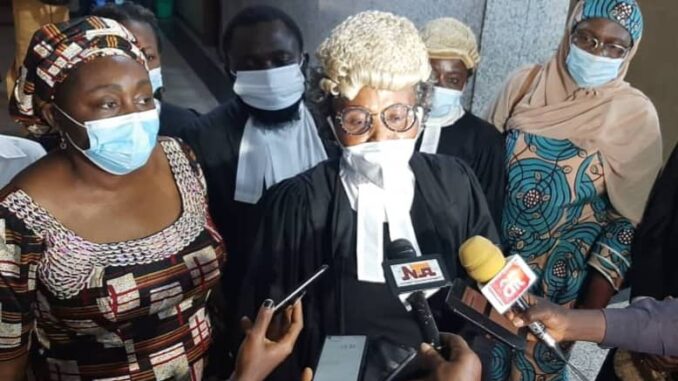
By Ayomide Olumuyiwa
A case involving Nigerian women against the Federal Government challenging the gender disparity in governance has been brought before a Federal High Court sitting in Maitama, Abuja, with Barrister Funmi Falana, appearing as their lead counsel.
The women had sued the Federal Government of Nigeria, joining President Muhammadu Buhari and the Attorney General of the Federation, Abubakar Malami, as defendants, to seek “inclusive governance that gives room for gender equity to reflect true democracy in Nigeria.”
As the case was heard on Monday, January 24, 2022 at the Federal High Court, Maitama, Abuja, before Honourable Justice Donatus Okorowo, Mrs Falana, the lead counsel to the plaintiffs informed the court that women had been marginalised too long in relation to appointment into decision making positions.
This, she argued was “in clear breach of the provisions of sections 147, 42 and 14 of the 1999 Constitution, Articles 19 and 18 of the African Charter on People’s and Human rights and other international human rights instruments like CEDAW, ICCPR and ICESCR.”
ALSO READ: Fidelity Bank enriches customers, holds second draw of GAIM 5 Promo
Falana further informed the court that the plaintiffs have a right of action and are competently before the court.
She prayed the judge to ensure strict compliance to the anti-discriminatory provisions of the Nigerian constitution and entrench Gender Equality in Nigeria, after which the court adjourned till 30 March 30 2022 for judgment.
• Background
Below is the joint statement of the women organisations who brought the case against the Federal Government of Nigeria.
The matter which began in 2020 is of National importance geared towards an inclusive governance to reflect true democracy in Nigeria was filed by Nigerian women seeking compliance on anti-discriminatory provisions of the Nigerian constitution and entrenching Gender Equality in Nigeria.
Relief sought by the plaintiffs are as follows:
(a) A DECLARATION that the failure of the 1st defendant to implement the 35percent affirmative action policy of the Federal Government of Nigeria is illegal, unlawful, null and an arbitrary violation of the National Gender Policy, 2006.
(b) A DECLARATION that the failure of the 1st defendant to implement the 35percent affirmative action policy of the federal Government of Nigeria is illegal, unlawful and a violation of sections 42, 147 (3) and 14 (3) of the 1999 Constitution as amended and Article 19 of the Adrian Charter of Human and People’s Rights.
(c) A DECLARATION that the overwhelmingly predominant appointment of the male gender into decision making positions of the Federation is wrong, unlawful, unconstitutional, null and void as it violates Sections 42,147(3) and 14 (3) of the 1999 Constitution as amended and Article 19 of the African Charter of Human and People’s Rights and does not violate the right of yeh female gender of equal access to public office.
(d) AN INJUNCTION restraining the 1st Defendant from further exercising the Constitutional and Statutory power of appointment in a manner violative of the 35 percent affirmative action policy of the Federal Government of Nigeria as contained in the National Gender Policy, 2006.
(e) AN ORDER MANDATING the respondents to henceforth comply with the principle of equality of the sexes in all appointments in compliance with Sections 42,147 (3) and 14 (3) of the 1999 Constitution as amended and Article 19 of the African Charter of Human and People’s Rights.
(f) AND ANY OTHER ORDER (S) this Honourable Court may make in the circumstance of the case.
The Towards Inclusive Governance in Nigeria is founded from the Legal Strategy Team which is a diverse group of stakeholders with deep interest in ensuring that Nigeria practices an inclusive governance.
Signed:
List of co-plaintiff organisations on behalf of Nigerian women and critical stakeholders:
1. Nigeria Women Trust Fund (NWTF)
2. Women Empowerment and Legal Aid (WELA)
3. Women in Politics Forum
4. Centre for Democracy and Development (CDD- WEST AFRICA)
5. Women Advocates Research and Documentation Centre (WARDC)
6. Vision Spring Initiatives (VSI)
7. YIAGA, Africa
8. International Federation of Women Lawyers (FIDA)
9. 100 Women Lobby Group




